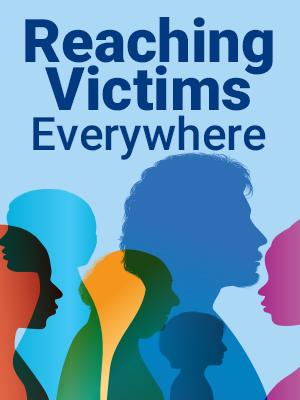Archival Notice
This is an archive page that is no longer being updated. It may contain outdated information and links may no longer function as originally intended.
Terrorism and Mass Violence
In recent years, the Nation has experienced a surge in incidents of mass violence and domestic terrorism. These tragedies have affected a range of communities—from small rural areas to large urban populations—and various locations, such as schools, workplaces, nightclubs, and public settings. As the frequency of these tragedies increases, OVC recognizes the need to become better prepared and equipped with the necessary knowledge, skills, and evidence-based strategies to appropriately plan for, respond to, and fully support victims and communities affected by mass violence.
In FY 2017, OVC launched a new National Mass Violence Victimization Resource Center (NMVVRC) to support the comprehensive needs of victims of mass violence and domestic terrorism and assess the needs of victims of large-scale criminal incidents. In FY 2020, OVC provided $3.4 million in supplemental funding to NMVVRC to achieve maximum benefit and outreach to impacted communities. In an effort to better determine the needs of mass violence victims and align services for them, NMVVRC created needs assessments for select communities affected by mass violence; formed a stakeholders forum for survivors and service providers to discuss lessons learned and promising practices; and continued its Resiliency Center Directors’ Forum of local Resiliency Centers that are typically developed following mass violence incidents.
In FY 2020, NMVVRC deployed the Transcend app, which includes features such as Calm Your Body, which promotes relaxation and well-being; Ease Your Mind; Cope with Loss, which provides coping strategies and activities; Reach Out, a social support resource; and Get Help Now, which provides information on how to access victim, financial, and legal assistance. NMVVRC has also authored numerous “Tip Sheets” and other materials that help victims and service providers. NMVVRC also altered the Community-Based Learning Collaborative Implementation Manual to include communities and victims impacted by mass violence incidents. Initial steps were also taken under the FY 2017 award to develop a Virtual Resiliency Center for survivors, and NMVVRC is continuing those efforts under the FY 2020 award.
In FYs 2019 and 2020, NMVVRC completed 28 technical assistance requests, with 1,075 recipients; and conducted a training for 79 participants representing mental health providers and educators/youth service providers. Out of a total of 76 post-training surveys; 87 percent of participants reported overall satisfaction and 84 percent reported an increase in knowledge. In addition to training and technical assistance (TTA), the center also completed 6 system-level improvements and implemented 23 improvement initiatives, including community awareness campaigns, training efforts, and development/deployment of new technology.
In FY 2020, OVC awarded nearly $3 million for the Improving Community Preparedness to Assist Victims of Mass Violence or Domestic Terrorism: Training and Technical Assistance Project. This project provides TTA and support to help communities augment their existing emergency response plans to ensure they effectively include immediate and long-term protocols and strategies to support victims of these events. The project is focusing on TTA for law enforcement and first responders; state, local, and tribal governments; and victim service providers.
OVC TTAC Supports First Responders to Mass Violence
OVC, through its Training and Technical Assistance Center (TTAC), provides TTA to communities across the Nation in implementing the tools and practices contained in OVC’s Helping Victims of Mass Violence and Terrorism: Planning, Response, Recovery, and Resources Toolkit. The toolkit helps communities collaborate and plan for these incidents and develop more timely, effective, and comprehensive responses for victims.
Victims of Crime Act (VOCA) victim assistance and victim compensation grants are awarded to states and victim service organizations to address the emotional, advocacy, and financial needs of victims of crime. From FY 2019 to FY 2020, VOCA victim assistance grants served an average of 11,440 victims of mass violence and an average of 2,570 victims of terrorism per quarter. In the same timeframe, VOCA victim compensation grants paid 3,682 claims related to mass violence and 278 claims related to terrorism.
For additional information, visit OVC’s website.




